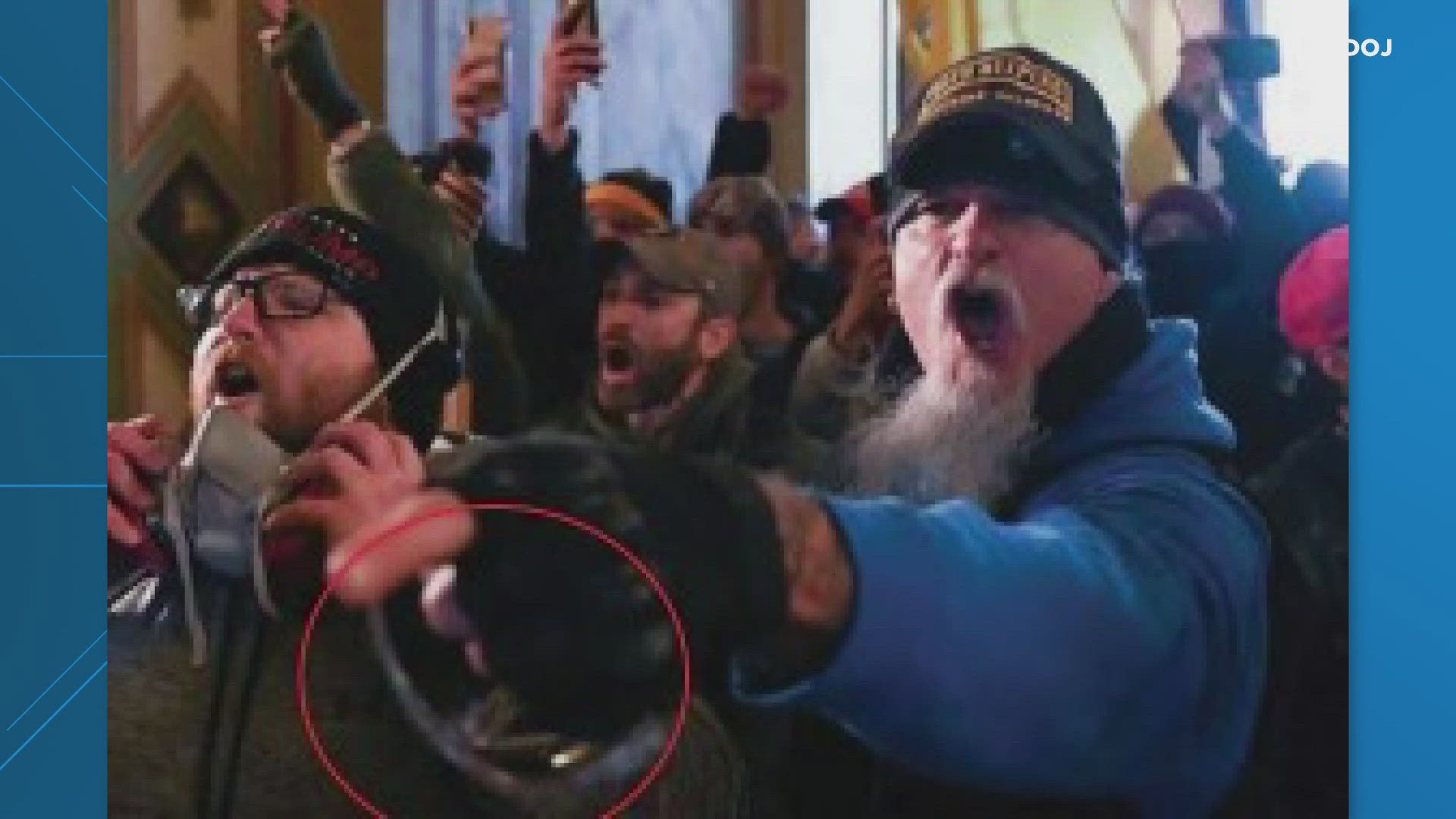WASHINGTON — A federal judge ordered three years of probation Friday for Jon Schaffer, the heavy metal guitarist and Oath Keepers lifetime member who became the first defendant to plead guilty in connection with the Jan. 6 attack on the U.S. Capitol.
Schaffer, 55, of Columbus, Indiana, pleaded guilty in April 2021 to two felony counts of obstruction of an official proceeding and entering and remaining in a restricted building with a dangerous weapon. Despite the U.S. Supreme Court’s decision earlier this year narrowing the scope of the obstruction statute, prosecutors and Schaffer’s attorney said in a joint statement earlier this month they believed he should still be sentenced on both counts.
Schaffer gained musical fame as one of the founders of the heavy metal band Iced Earth in the 1980s. But he came to the Capitol on Jan. 6 as an ardent supporter of former President Donald Trump who believed the results of the 2020 election were “fraudulent.” Although Schaffer had previously marched with the Oath Keepers during a pro-Trump event in D.C. in November 2020, he did not join the group on Jan. 6 and was not part of any of the group’s encrypted chats that day.
While other members of the militia eventually entered the east side of the building, Schaffer, armed with bear spray and wearing a tactical vest and “Oath Keepers Lifetime Member” hat,” entered the building at the front of a mob that broke open doors being guarded by officers on the west side. Schaffer and the mob continued chasing policing into the building, but he eventually exited after being sprayed in the face with chemical irritant.
On Jan. 17, 2021, Schaffer turned himself in to the FBI in connection with the riot. Three months later, he became the first Jan. 6 defendant to plead guilty.
Schaffer’s sentencing had been delayed for years due to his ongoing cooperation with the Justice Department’s investigation into the Capitol riot, and then by the Supreme Court’s decision to hear another defendant’s appeal of the obstruction statute used in hundreds of Jan. 6 cases. Details about specific information Schaffer provided are redacted in a sentencing report filed by federal prosecutors last week, although they note he was privy to some of the Oath Keepers communications in which militia founder Stewart Rhodes made increasingly violent calls to oppose the lawful transfer of power after the 20202 election. Unlike other cooperators in the Oath Keepers case, Schaffer was never called as a witness at trial.
At the time he entered his plea deal, Schaffer faced an estimated sentencing guidelines range of 41-51 months in prison. A decision by the D.C. Circuit Court of Appeals in March about what enhancements were applicable in Jan. 6 cases reduced that range to 10-16 months. Schaffer served approximately three months in jail following his arrest before he was released on bond.
Last week, federal prosecutors filed a motion for a downward departure for substantial assistance, also known as a “5K letter,” asking a judge to sentence Schaffer to three years of probation. Prosecutors credited Schaffer’s swift and forthright cooperation and said his decision to do so in such a high-profile investigation potentially put himself at risk.
“To be the first person to plead guilty, and to do so pursuant to a public cooperation plea agreement, in a case that has garnered such national interest and, sadly, controversy, took courage on Schaffer’s part,” Assistant U.S. Attorney Kathryn Rakoczy wrote in the government’s sentencing memo. “While the government is not aware of any direct threats to Schaffer or his family, other individuals who cooperated publicly with the government in this investigation have received such threats. Thus, this court should give Schaffer credit for the danger and risk of injury to himself and to his family that resulted from his entry into a public cooperation plea agreement in this case.”
On Friday, U.S. District Judge Amit P. Mehta, who presided over all of the Oath Keepers seditious conspiracy trials, agreed with prosecutors and sentenced Schaffer to three years of supervised release and $1,000 in restitution. He said he thought it was "powerful" when Schaffer agreed to become the first defendant to cooperate with the government — although said it didn't have the effect he'd expected.
"I certainly thought that your example would cause others to come forward and admit what they'd done and cooperate," Mehta said. "That didn't really happen."
Schaffer, who has never made a public statement about his decision to plead guilty, spoke briefly Friday before his sentencing. He apologized for the "pain and embarrassment" his actions caused and said he hadn't lived up to what he'd learned in 30 years as a world-touring musician. He said he hopes the fans of his music will eventually forgive him.
"I'm sorry I let you down and I will work hard to rebuild your trust," Schaffer said.
Other Oath Keepers charged in connection with the Capitol riot who were convicted at trial have received widely varying sentences, including some of the longest handed down to date. Rhodes, the militia’s founder, was sentenced in May 2023 to 18 years in prison. His lieutenant, Florida Oath Keepers leader Kelly Meggs, was sentenced to 12 years. Jessica Watkins, a U.S. Army Veteran from Woodstock, Ohio, received 8.5 years behind bars.
Others have received far lesser terms. Meggs’ wife, Connie Meggs, was sentenced to 15 months in prison for conspiring to obstruct the joint session of Congress. At least three defendants – William Isaacs, a 23-year-old aspiring firefighter from Florida, and Sandra and Bennie Parker, ages 63 and 72, respectively, of Ohio – were sentenced to five years of probation.

